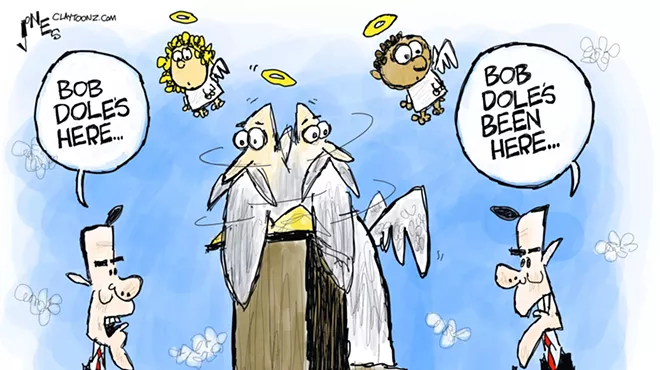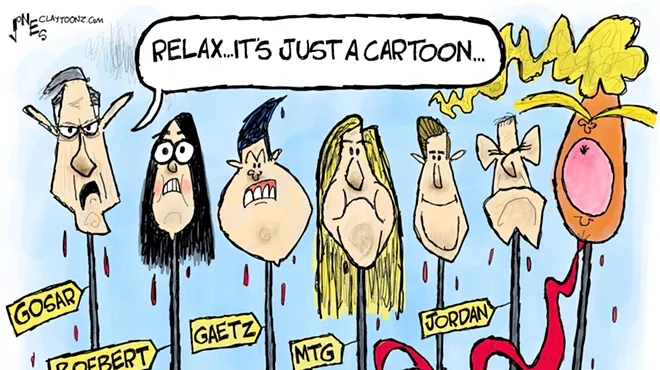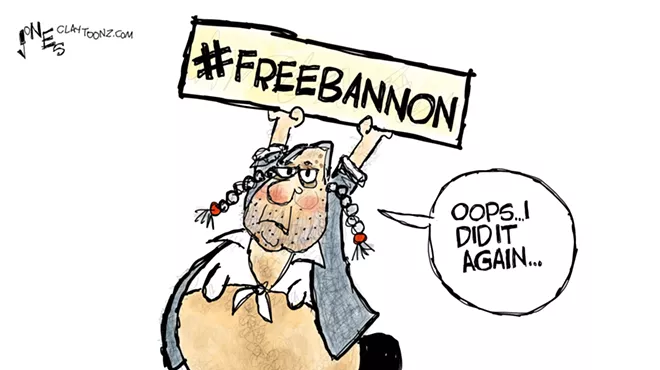Monday, February 11, 2013
'Arizona Daily Star' Readers: This is Why You're Paying More But Getting Less For Your Subscription
For an organization that has been hemorrhaging money for years, has nearly half the workforce it did in 2008 and whose quality continues to decrease on a daily basis, the Arizona Daily Star sure does love to spend money on frivolous litigation.
Last week the Star — and, according to the filing, rumpled environmental reporter Tony Davis — sued the U.S. Fish and Wildlife Service in federal court over documents that the Star requested to review regarding the infamous Macho B jaguar story. The suit cites the Freedom of Information Act and that the act was violated when, after requesting the documents nearly two years ago, they were released last year missing some pages and having lots of redactions on others.
For those not keeping up with the Macho B tale (which is impossible if you read the Star; you'd think the animal was Lute Olson's pet), it entails the capture in 2009 of what was then believed to be the last known jaguar in the U.S. The animal ended up dying, and $3 million (looking for places to slash the federal budget? start here, please) was spent investigating what, if anything, was done wrong.
According to the suit, Davis, a longtime Star reporter known as much for his immensely long stories on local environmental issues as he is his (ahem) eccentric personality, first emailed Fish and Wildlife in May 2011 to request the investigative report. He did so a couple other times, then in February 2012 got more than 3,430 pages of material from the feds.
But, according to the suit, many pages were 'heavily redacted' and another 230 were supposedly missing. Appeals were made to get the rest of the report, but when those went answered the Star did what (other than maybe UA basketball and football coverage) it does better than anyone else:
It whipped out the checkbook to hire expensive lawyers to pursue something that's just not worth spending a lot of money on, especially when your parent company's stock is barely above $1 a share and your newsroom is collecting dust on all those desks where those laid off in the last four years used to sit.
The sue-no-matter-what-the-cost approach is nothing new for the Star, which in the last few years has done this several times to make mountains out of molehills.
Take, for example:
* The 2009 federal lawsuit against a no-name local punk band, Awful Truth, citing copyright infringement because the band used a Star picture of slain Tucson police officer Erik Hite on the cover of it's album 'Kill a Cop for God.' The use of the photo was certainly in poor taste, and the band should have tried to get permission to use it, but that certainly didn't warrant a federal suit.
* A failed suit in March 2009 challenging a Pima County Superior Court judge's ruling that one witness in the death penalty murder trial of Christopher Payne could not be named by local media. The witness was an inconsequential one, but because the prosecution didn't want the woman — who was in the process of adopting a child of the defendant's — printed, that sprung the Star's legal beagle ears up and prompted the paper to swoop in with its own lawyers to say this wasn't fair. Didn't matter that the paper had no intention of naming the person to begin with, but the fact it was told it couldn't meant, well, they just had to fight for the right to do so.
The Star has also thrown lawyers at many other issues, whether it be defending allegations it's stories were incorrect — a simple 'we stand by our reporter' would have sufficed in most cases — or getting snippy because someone created a parody Twitter account so they tried to get the account closed down.
Meanwhile, the everyday product produced by the Star continues to decrease in quality.
Just remember that the next time the subscription price or the cost of a single copy goes up again. Or when the inevitable paywall drops on the Star's Web site.









